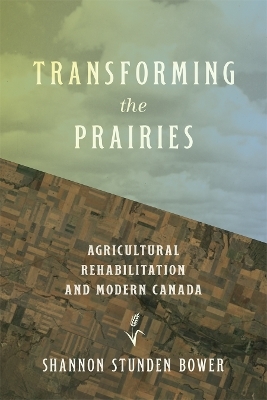
Transforming the Prairies
Agricultural Rehabilitation and Modern Canada
Seiten
2024
University of British Columbia Press (Verlag)
978-0-7748-7039-9 (ISBN)
University of British Columbia Press (Verlag)
978-0-7748-7039-9 (ISBN)
- Lieferbar (Termin unbekannt)
- Versandkostenfrei
- Auch auf Rechnung
- Artikel merken
Transforming the Prairies critically reassesses Canada’s Prairie Farm Rehabilitation Administration in light of its involvement in ecological changes and its role in consolidating colonialism and racism.
Transforming the Prairies proposes a new understanding of Canada’s Prairie Farm Rehabilitation Administration (PFRA), complicating common views of the agency as a model of effective government environmental management. Between 1935 and 2009, the PFRA promoted agricultural rehabilitation in and beyond the Canadian Prairies with mixed and equivocal results. The promotion of strip farming as a soil conservation technique, for example, left crops susceptible to sawfly infestations. The PFRA’s involvement in irrigation development in Ghana increased the local population’s vulnerability to various illnesses. And PFRA infrastructure construction intended to serve the public good failed to account for the interests of affected Indigenous peoples. The PFRA is revealed as being a high modernist state agency that produced varied environmental outcomes and that contributed to consolidating colonialism and racism. This investigation affirms the importance of engaging historical perspectives to help ensure that contemporary environmental management efforts support more just and sustainable futures.
Transforming the Prairies proposes a new understanding of Canada’s Prairie Farm Rehabilitation Administration (PFRA), complicating common views of the agency as a model of effective government environmental management. Between 1935 and 2009, the PFRA promoted agricultural rehabilitation in and beyond the Canadian Prairies with mixed and equivocal results. The promotion of strip farming as a soil conservation technique, for example, left crops susceptible to sawfly infestations. The PFRA’s involvement in irrigation development in Ghana increased the local population’s vulnerability to various illnesses. And PFRA infrastructure construction intended to serve the public good failed to account for the interests of affected Indigenous peoples. The PFRA is revealed as being a high modernist state agency that produced varied environmental outcomes and that contributed to consolidating colonialism and racism. This investigation affirms the importance of engaging historical perspectives to help ensure that contemporary environmental management efforts support more just and sustainable futures.
Shannon Stunden Bower is an associate professor in the Department of History, Classics, and Religion at the University of Alberta. She is the author of Wet Prairie: People, Land, and Water in Agricultural Manitoba, which won the Canadian Historical Association Clio Prize for the Prairies and the Manitoba Day Award from the Association for Manitoba Archives. She has also published articles in journals such as Environmental History and Agricultural History.
| Erscheinungsdatum | 14.11.2024 |
|---|---|
| Reihe/Serie | Nature |
| Zusatzinfo | 15 b&w photos, 11 maps, 2 charts |
| Verlagsort | Vancouver |
| Sprache | englisch |
| Maße | 152 x 229 mm |
| Themenwelt | Geisteswissenschaften ► Geschichte ► Regional- / Ländergeschichte |
| Geisteswissenschaften ► Geschichte ► Teilgebiete der Geschichte | |
| Sozialwissenschaften ► Politik / Verwaltung ► Staat / Verwaltung | |
| Weitere Fachgebiete ► Land- / Forstwirtschaft / Fischerei | |
| ISBN-10 | 0-7748-7039-7 / 0774870397 |
| ISBN-13 | 978-0-7748-7039-9 / 9780774870399 |
| Zustand | Neuware |
| Haben Sie eine Frage zum Produkt? |
Mehr entdecken
aus dem Bereich
aus dem Bereich
Universalgelehrter, Polarreisender, Entdecker
Buch | Hardcover (2024)
mareverlag
CHF 39,20


